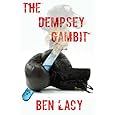 The premise of The Dempsey Gambit is human cloning and the ethics behind successfully cloning another human being. The story adds dimension to this question with the ability to clone anyone from history with a full memory provided scientists can find their residual energy signature in a particular place. Lacy does not go for the cliché idea of cloning someone like Albert Einstein, Adolf Hitler, or any other prominent figure in history. Rather, the story revolves around the cloning of former heavyweight champion Jack Dempsey, all for the sake of a desperate boxing manager bouncing on financial thin ice. The scientists involved did it for the funding only to discover that duplicating a human being is not as simple as it seems on paper.
The premise of The Dempsey Gambit is human cloning and the ethics behind successfully cloning another human being. The story adds dimension to this question with the ability to clone anyone from history with a full memory provided scientists can find their residual energy signature in a particular place. Lacy does not go for the cliché idea of cloning someone like Albert Einstein, Adolf Hitler, or any other prominent figure in history. Rather, the story revolves around the cloning of former heavyweight champion Jack Dempsey, all for the sake of a desperate boxing manager bouncing on financial thin ice. The scientists involved did it for the funding only to discover that duplicating a human being is not as simple as it seems on paper.The beauty of the story comes from watching as the cloned Jack Dempsey adapts to a new world and society almost a century after his own. He has the memories of the original Dempsey as well as the skill, prowess, and strength of the original, but once he understands his new surroundings, he starts to see if he can make his own life without just following in the original's footsteps. The story also follows the female scientist, Rebecca, involved in his cloning and the ethical questions she cannot escape.
The story is a complicated twist of drama, enemies become close friends, and moral questioning that is just lovely. Lacy rarely gets overly cliché and does an excellent job of making Dempsey both a fish out of water and a person who is light years ahead of society with his simplistic angles of thinking. Lacy begs the question of whether cloning is something to really pursue in this society, or if perhaps science should leave well enough alone. This book is more of a dive into moral waters than pure science fiction, so keep that in mind before picking it up.
A few things that keep this book from being perfect is a need for a thorough line editor. There are enough mistakes with spelling, verb tense, possessives, and punctuation that threaten the integrity of the story. Also, there is a transition problem in the first half of the book when narration switches between Jack's and Rebecca's perspectives. A full sentence or perhaps simply providing the dates and times at the beginning of chapters would allow an easier transition without the need to think of news ways to introduce time overlap. Finally, there is almost too much on boxing that a layman, like myself, starts to feel burdened with knowledge. There is a fine line between showing the audience that you did your homework and giving so much information that the audience becomes disinterested. Those sections need to be culled in order to fit with the rest of the book.
Overall, I recommend this book as long as you keep those minor errors mentioned in mind. Kudos, Mr. Lacy.
The book is available for the Kindle.
No comments:
Post a Comment